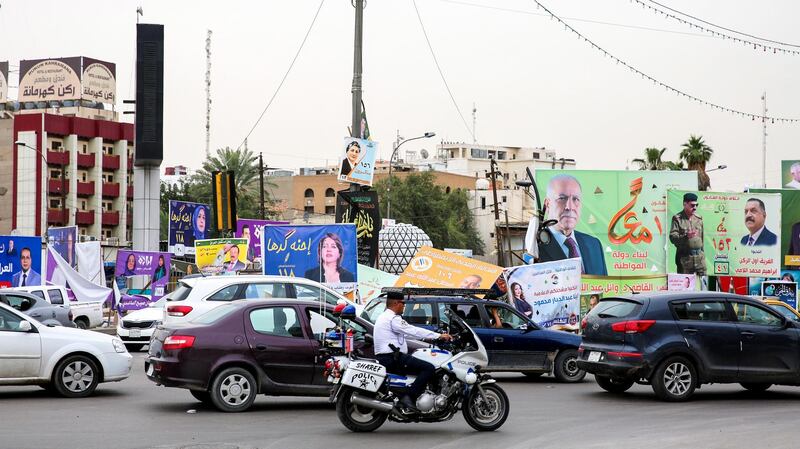The US embassy in Baghdad has called for an investigation into alleged attacks on female candidates in the Iraq’s upcoming parliamentary elections.
The embassy expressed “concern” on Saturday, after online smear campaigns, derogatory videos and comments targeted several women candidates.
“Attempts to insult candidates’ dignity are abusive, violate the principle of fair competition, and threaten the integrity of the electoral process,” the embassy said.
It found the attacks against women to be “disheartening and reprehensible”.
“We urge an end to these actions and call for an investigation into all alleged violations of electoral regulations,” the embassy said.
Women make up 28 per cent of the nearly 7,000 candidates competing for 329 seats in the general election next month — Iraq's fourth since 2003.
Images circulated online showed posters of women candidates being subjected to vulgar acts.
The US embassy called on "all political blocs, candidates, and the media to run respectful campaigns and to uphold the concepts enshrined in the Electoral Charter of Honour signed by political blocs earlier this year".
Hana Edward, a prominent Iraqi women's right activist, told The National that "women's rights movements in Baghdad collected over 200 signatures petitioning against the horrid treatment of candidates".
"We are doing our best to ensure women's participation in the upcoming elections," she said.
_______________
Read more:
[ Iraqis disillusioned with 'same old faces' ahead of election ]
[ ISIS group releases video showing shootings in Iraq ]
[ Former footballers seek to shake up politics in Iraq ]
_______________
The special representative of the UN secretary general for Iraq, Jan Kubis, said the targeting of women brings "anguish" to the candidates and poses as a threat to the integrity of the electoral process.
He urged political parties and all of Iraqi society to stand up against vulgar acts that only serve to undermine the democratic process.
"Vulgar acts against posters of women candidates and attacks against reputation and honour of candidates and their families, pressing them to step down, particularly bring anguish to women," Mr Kubis said during a meeting with several women candidates.
"Those behind defamation, cyber bullying and harassment are trying to scare you off, afraid of educated, dynamic, qualified, courageous and open-minded women candidates that rightfully claim their space and meaningful role in political life of Iraq as a critical factor of positive change,” he said.
After the toppling of dictator Saddam Hussein in 2003, women’s groups called for a quota in parliament, originally seeking 40 per cent of seats but managing to get only about a quarter.
Member of parliament Antithar Al Shammari was dropped as a candidate from Prime Minister Haider Al Abadi's electoral list on Thursday after a salacious video purportedly featuring her was circulated online.
Mrs Al Shammari said the video was fake and urged the public to "not question the dignity of Iraqi women".
Another candidate for the Kurdistan Democratic Party, Dr Heshu Rebwar Ali, had her mobile phone stolen, and a video of her wearing a short dress was published online, according to Kurdish media.
Mrs Ali spoke out against the video and said that she was with her husband at a private event.
"Everyone is entitled to her freedom and private life," she told reporters.
Hala Karim, a health ministry employee, accused Iraq's political old guard of posting defamatory videos of newcomers online to knock them out of contention.
"The big sharks can only think of defaming us to stay in power," Ms Karim, who is running on an independent list, Tahalouf Baghdad (Baghdad Coalition), told Agence France-Presse.






